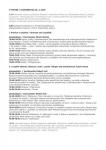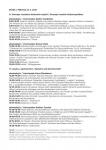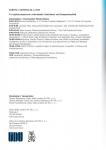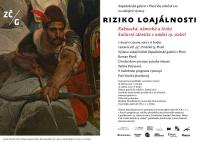The 45th annual Pilsen Symposium begins
On March 6, 2025, you can join us at the 45th annual Pilsen Symposium, this time on the topic of "The New World: American Experience in 19th-Century Central European Culture.
The program is streamed https://us02web.zoom.us/j/84575220710?pwd=vZK5G1yd9rkVU9DLGobK8MW2z1GK0O.1
The program of the 45th Pilsen Symposium
The New World: American Experience in Czech and Central European Culture of the 19th Century/ Nový svět: Americká zkušenost Středoevropana v kutluře 19. století
Pilsen, March 5-7, 2025 West Bohemian Museum; Plzeň, 5.–7. března 2025, Západočeské muzeum v Plzni
The program attached / program přiložen
Venues: March 5, 2025 Semler Residence, Klatovská 721, Pilsen (opening lecture in Czech); March 6-7, 2025 West Bohemian Museum in Pilsen, Kopeckého sady 2 (conference); March 6, 2025 at 5pm. West Bohemian Gallery in Pilsen, exhibition hall "13", Pražská 13 (exhibition opening).
Místa konání: 5. března 2025 Semlerova rezidence, Klatovská 721, Plzeň (zahajovací přednáška v češtině); 6.–7. března Západočeské muzeum v Plzni, Kopeckého sady 2 (sympozium); 6. března 2025 v 17:00 Západočeská galerie v Plzni, výstavní síň "13", Pražská 13 (vernisáž)
Organized by the Institute of Art History of the Czech Academy of Sciences (supportet within the program Strategie AV 21), in cooperation with the West Bohemian Museum in Pilsen, the West Bohemian Gallery in Pilsen and the Pilsen Philharmonic.
Pořádá Ústav dějin umění AV ČR (s podporou programu Strategie AV 21), ve spolupráci se Západočeským muzeem v Plzni, Západočeskou galerií v Plzni a Plzeňskou filharmonií.
Program 6. 3. 2025 je streamován.
Call for papers
The New World: The American Experience in Czech and Central European Culture of the 19th Century (Pilsen, March 6-7, 2025)
Charles Sealsfield (1793–1864), Clara Gerstner (1813–1881), Miroslav Tyrš (1832–1884). Three Central European writers - a jurist, a wife of a railway engineer and an aesthetician - whose work was influenced by their stays in America or thinking/reading about it, respectively in years 1822-1829, 1838-1840 and 1872. The experience from the New World as a direct or mediated idea of the possibilities of the American continent and its culture, politics and economy compared to the European tradition will be the topic of the 45th Pilsen conference.
What did the American experience represent as a challenge and inspiration in the Czech culture within the European context during the 19th century? What experiences of philosophers, businessmen, religious reformers, artists etc. shaped the image of America during the long 19th century, ranging from the image of a "wild" and "exotic" continent to the idea of a land of unexpected technological progress and unlimited life and career possibilities? How did information and notions about the North American continent spread and change and how did they differ from South American experiences shaped also by Habsburg politics? In what way did attitudes towards colonial politics differ across Central Europe, and how were they reflected in the arts, socio-politics, and every day life?
Already the first contacts with the New World provoked curiosity in Europe. The encounter with new experiences, with the first nations people, and their local environment led to the formation of the image of America as a wild continent, but also as a land of unknown possibilities, in both the positive and negative senses. The effort to deal with new experiences and information generated innovative views and approaches, but also a number of stereotyped images and attitudes. Enthusiasm and admiration for the newly discovered land was soon to be paralleled by a more critical view of social reality, living conditions as well as colonizing relations.
The conference aims to address the following topics:
- Democratization, social and cultural issues of modern society vs. the South/North American experience
- An idealized and critical view of New World, its culture and society
- The development of society as a philosophical, economic and cultural constant
- Marketing of American artefacts, collecting, migration of objects
- Ethnology, colonialism and the relation to the first nations and Afro American populations of the New World
- Images of America and its inhabitants in Central European culture
The main language of the conference will be Czech, but contributions in German and English are welcome. Please send the abstracts of your contribution proposals (of ca 250 words) to Pavla Machalíková (machalikova@udu.cas.cz) and Taťána Petrasová (petrasova@udu.cas.cz) by September 30, 2024 at the latest.
The program of the 42nd Pilsen Symposium
The program of the 42nd Pilsen Symposium, 2-4 March 2022 can be found here.
„The Work and Transformations of Thought in Nineteenth-Century Czech Culture,“ Pilsen, West Bohemian Museum in Pilsen, Kopeckého sady 2, Pilsen
The conference is organized by the Institute of Art History of the Czech Academy of Sciences in cooperation with the West Bohemian Museum in Pilsen and the Pilsen Philharmonic.
The conference includes an exhibition of the West Bohemian Gallery in Pilsen, „The Work and the Transformation of the Art Scene,“ Gallery "13", Pražská 13, Pilsen, 4 March to 29 May 2022, which was prepared by the Institute of Art History of the Czech Academy of Sciences in cooperation with the West Bohemian Gallery in Pilsen. The exhibition space project is supported by the Czech Academy of Sciences funding scheme AV 21 Strategy http://databazevystav.udu.cas.cz).
Current government regulations for holding and participating in public events will apply to the conference participants. You can follow us on the YouTube channel of the Institute of Art History.
28/2/2022
Proceedings from the 40th Pilsen Symposium have been published
In the Academia Publisher (Prague) has came out a new volume from the proceedings edition devoted to the Czech culture of the 19th century: Zdeněk Hojda and Eva Bendová (eds), Od práce k zábavě. Volný čas v české kultuře 19. století [From work to entertainment: Spare time in Czech culture of the 19th century].
Available at your favorite booksellers, in March 2021 for sale online.
Call for Papers Plzeň 2022
Artworks, Ideas and Transformations in Thinking in 19th-Century Czech Culture
2–4 March 2022, Plzeň, Museum of West Bohemia in Plzeň (In case of anti-covid restrictions in hybrid or online form.)
The 42nd annual Plzeň symposium on 19th-century issues, organised by the Institute of Art History, Czech Academy of Sciences, in cooperation with the Museum of West Bohemia, the Gallery of West Bohemia in Plzeň, and the Plzeň Philharmonic Orchestra. Deadline for submitting abstracts: 30 November 2021.
Over the centuries, the Czech lands have been a place where the history of Europe has paused at key moments, but only rarely have they been given the opportunity to influence the direction taken by Europe through their economic, philosophical, cultural, or scientific contributions. According to the Czech philosopher Ladislav Hejdánek, the traditional model of thinking understands development only in that “lesser, less original, and less profound creators imitate a creator who is exceptional and greater than the others by imitating their work” (Dílo jako událost [A Work as an Event], 1970). As it follows from Hejdánek’s reflections, however, once a work is created it fundamentally changes the situation in which every succeeding creator finds themself. Inspiration often leads to a denial of what was its source.
The theme of the 42nd annual Plzeň symposium will be works (artistic, literary, scientific etc.) which fundamentally changed the Czech-German-Austrian political, social, and cultural situation, whether by being translated from their original language, or by starting to be interpreted and denied by other works without acknowledgement, in an attempt to bring about changes in society. We will also be interested in “unexpected about-turns” and changes of interpretation or intended direction, and likewise in transfers, the mediation of foreign works in the Czech lands via “other” culture.
The main language of the conference will be Czech; contributions in German and English are welcome. Please send annotations of your contributions to Pavla Machalíková (machalikova@udu.cas.cz) and Taťána Petrasová, (petrasova@udu.cas.cz) by November 30, 2021 at the latest.
18/10/2021
The New Proceedings of Pilsen Sympozium "The Light, Schadows and the Darkness" have just come out
Academia publishes the new volume of Pilsen Sympozium "The Light, Schadows and Darkness" edited by Zdeněk Hojda, Marta Ottlová, and Roman Prahl. More information on our webside in Publications section.
26/2/2018
Understand a Second, 22.–24. February 2018
Dear Colleagues and Colleagues,
Do not forget the organizers of the Pilsen symposium "Understand a second", 22.-24. February 2018, Kateřina Piorecká (Institute of Czech Literature of the Czech Academy of Sciences) to fill-in and send the application form no later than 12th February 2018.
You will find the application form in the Contacts field.
We look forward to you!
2. 2. 2018
Man and Machine in the 19th Century Bohemian Culture
Proceedings of the 32th annual symposium on 19th-century issues has come out in the Academia publishing house.
Unvisible Loyalty, Pilsen 2015
On 26-28 February 2015 an international conference will take place in Pilsen entitled “The Unvisible Loyalty”. This three-day meeting of specialists is the 35th year of interdisciplinary conferenc held in Pilsen, focusses on the problem of the fidelty, the oath and the loyalty in the Austrian-German-Czech society in the 19th century.
Venue: Západočeské muzeum (Westbohemian Museum), Kopeckého sady 2, 4A, Pilsen.
Plzeň 2015: Invisible Loyalty? Austrians, Germans and Czechs in 19th-Century Czech Culture
The organisers of the 35th Plzeň Symposium on 19th-Century Issues have announced that the theme for the Symposium on 26-28 February 2015 will be “Invisible Loyalty? Austrians, Germans and Czechs in 19th-Century Czech Culture”.
The concept of loyalty is used by psychologists, sociologists, writers on religion, lawyers, cultural and social historians, political economists, and contemporary theorists on management, in connection with slightly ambivalent terms such as loyalty oaths, patriotism, professional loyalty, and personal integrity.
Since the classical description in the philosopher Josiah Royce’s book The Philosophy of Loyalty (1908), the interpretation of loyalty has developed as that of duty that places non-personal (or impersonal) duty above the feeling of personal responsibility. Loyalty, the manifestation of inner confidence and commitment, can be displayed towards an individual, a group, or society. The key question can be considered to be that of the forms in which it is displayed and the value ambivalence of its implementation. Recently this analytical category has been used, for example, as a productive concept in the historical works of German experts on Czech history (e.g. M. Schulze-Wessel (ed.), Loyalitäten in der Tschechoslowakischen Republik 1918-1938. Politische, nationale und kulturelle Zugehörigkeiten, 2004; Volker Zimmermann, Peter Haslinger and Tomáš Nigrin (edd.), Loyalitäten im Staatssozialismus: DDR, Tschechoslowakei, Polen, 2010), but it had already been developed earlier, for example in American sociolinguistic studies (e.g. Joshua Fishman, Language loyalty in the United States, 1966). The relevance of the issue of loyalty in Czech society today is testified to by the continuing debates on the relationships between the Czechs and the Habsburgs, the Catholic Church, the political institutions of the Austrian monarchy, and the aristocracy (and of course in the opposite direction as well). However, these debates do not work with the concept of loyalty at all, although an awareness of its existence would clarify the position of its adherents and opponents.
The 35th Plzeň Interdisciplinary Symposium which is being prepared will be devoted to the historical roots and development of the multinational Czech-German-Jewish society in the Austrian monarchy during the “long” 19th century. Questions will be raised about the motives and forms of action of both those who stabilised and supported, and those who disturbed and destroyed the political, confessional, military, social, and cultural system of the Czech lands in the “long” 19th century, processes that took place through the interventions of various actors in various contexts, defined by linguistic, local and time-related criteria. We intend to pay particular attention to an analysis of the loyalty of the inhabitants of the Czech lands towards the Habsburg dynasty, towards Czech culture (whether defined geographically or linguistically), and towards the “supranational” institutions of the Monarchy (the Church, the army, and the school system). We will of course also take an interest in the positions of those who for various reasons refused to maintain a position of loyalty.
This contentious theme, posing questions that are relevant to today’s global but by no means harmonious world, needs to be reflected on in a broader framework – both across individual disciplines, and in a debate with colleagues from other countries, especially the German-speaking ones. The date chosen for holding the symposium – in 2015, when Plzeň will be a European Capital of Culture – thus underlines the relevance and importance (not only for experts in the field) of the theme we have outlined.
The Symposium will be organised by the Institute of Art History, Academy of Sciences of the Czech Republic, and the Institute of Czech Literature, Academy of Sciences of the Czech Republic.
Papers together with a summary (100 characters) can be submitted up until 30 September 2014. The selection of papers for inclusion in the programme will be made by a broader organisational committee.
More information about the Symposium programme is available from:
Pavla Machalíková: machalikova@udu.cas.cz
Václav Petrbok: petrbok@ucl.cas.cz
Taťána Petrasová: petrasova@udu.cas.cz
25. 8. 2014
design by Bedřich Vémola





